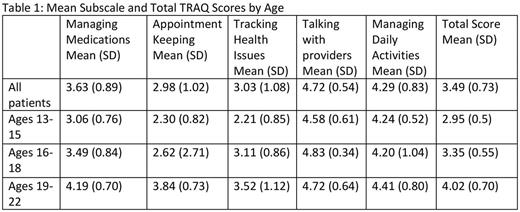Abstract
Background
The transition from pediatric to adult care can be a difficult time for young adults with sickle cell disease (SCD) who experience increased rates of acute care utilization and worse health outcomes. An important aspect of transition preparation includes an assessment of transition readiness. Data show that adolescents with SCD have suboptimal transition readiness, however most studies use disease specific measures which do not allow for comparisons between patient populations. The Transition Readiness Assessment Questionnaire (TRAQ) is a validated tool for youth with a variety of medical diagnoses. We have been collecting TRAQ data on our patients for the past 6 months as part of an ongoing quality improvement initiative. The purpose of this study is to analyze transition readiness scores among patients with SCD in our program, and to compare their scores with other populations of youth with special health care needs.
Methods
We administered the TRAQ to patients with SCD ages 13 to 22 seen in general pediatric hematology clinic or our specialized transition clinic from December 2015 to June 2016. The TRAQ contains 20 questions which measure transition readiness in five domains: managing medication, appointment keeping, tracking health issues, talking with providers, and managing daily activities. Each question is answered on a 5-point scale based on the transtheoretical model from 1 = "No, I do not know how to do this" to 5 = " Yes, I always do this when I need to". Mean TRAQ scores were analyzed by age and compared to reported TRAQ scores among other diagnostic groups in the literature.
Results
Fifty patients completed the TRAQ during the study period. One patient was ineligible due to cognitive delay. This represents 58% of eligible patients in our practice. Respondents were 50% female with a mean age of 17 years 9 months. The majority (70%) have HbSS.
The mean overall TRAQ score was 3.5 (SD 0.72) with the highest scores in the domains of communication with providers and managing daily activities. As has previously been reported mean TRAQ scores were higher among young adults compared with older and younger adolescents. (Table 1) Our patients reported high readiness in certain aspects of medication management, with 69% of respondents stating that they always take medications correctly. However, respondents were less likely to favorably report filling needed prescriptions or reordering medications when they run out (only 22% and 27% of respondents respectively reported always completing these tasks). Questions related to insurance coverage had low scores overall; 65% of patients responded that they do not know how to apply for insurance if they lose their coverage, and 47% do not know what their insurance covers.
Compared to reported TRAQ scores among patients with chronic health conditions other than SCD, our patients had lower scores in the domains of managing medications (3.63 vs 3.93), appointment keeping (2.98 vs 3.41) and tracking health issues (3.03 vs 3.33)
Conclusions: By using a non-disease specific transition readiness tool we were able to analyze transition readiness in our clinic population of adolescents and young adults with SCD and compare our findings with the literature on youth with special health care needs. While it is encouraging that TRAQ scores were higher among older patients, mean scores still show room for improvement even among 18-22 year olds. Lower scores in medication management and appointment keeping in our population are particularly concerning as these aspects of chronic disease self-management are key to a successful transition to adult care.
Additional work is needed to determine how transition readiness changes with time, and how we can help improve self-management and self-advocacy skills among our patients with SCD.
No relevant conflicts of interest to declare.
Author notes
Asterisk with author names denotes non-ASH members.


